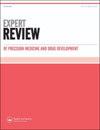Noninvasive biomarkers to guide intervention: toward personalized patient management in prostate cancer
IF 1.2
Q4 PHARMACOLOGY & PHARMACY
Expert Review of Precision Medicine and Drug Development
Pub Date : 2020-08-03
DOI:10.1080/23808993.2020.1804866
引用次数: 4
Abstract
ABSTRACT Introduction Prostate cancer (PCa) is one of the most frequently diagnosed malignancies worldwide and is associated with high mortality. Broad screening through prostate-specific antigen analysis, along with an aging and growing population has resulted in a vast increase in PCa incidence. As not all PCa forms are life threatening, personalized management is of paramount importance to preserve survival and quality of life for the diagnosed patients. Owing to the complexity of PCa, noninvasive biomarkers for diagnosis, stratification and monitoring, are essential to tailor intervention among patients with different disease manifestations. Areas covered In this article, we aim to provide a critical assessment of the reported noninvasive biomarkers for PCa and their applicability according to the targeted clinical context. For this purpose, a systematic review of the literature published within the last five years was performed, focusing on noninvasive biomarkers to guide initial and repeated biopsies, stratify for active surveillance, monitor biochemical recurrence and metastasis, and adjust treatment for metastatic castration resistant PCa. Expert’s opinion Evidence from clinical trials on novel drugs and latest technological advancements, indicate several clinical applications for biomarkers to tailor intervention throughout PCa progression, toward a more personalized medicine approach in PCa clinical management.指导干预的无创生物标志物:前列腺癌症患者个性化管理
摘要简介癌症是全球最常见的恶性肿瘤之一,与高死亡率相关。通过前列腺特异性抗原分析进行的广泛筛查,以及人口的老龄化和增长,导致前列腺癌发病率大幅增加。由于并非所有PCa形式都有生命危险,因此个性化管理对于保持确诊患者的生存率和生活质量至关重要。由于前列腺癌的复杂性,用于诊断、分层和监测的非侵入性生物标志物对于针对不同疾病表现的患者进行干预至关重要。涵盖的领域在本文中,我们旨在根据目标临床背景,对所报道的PCa的非侵入性生物标志物及其适用性进行关键评估。为此,对过去五年内发表的文献进行了系统综述,重点关注非侵入性生物标志物,以指导初次和重复活检,对主动监测进行分层,监测生化复发和转移,并调整转移性去势耐药前列腺癌的治疗。专家意见来自新药临床试验和最新技术进步的证据表明,生物标志物在PCa进展过程中的几种临床应用,旨在为PCa临床管理提供更个性化的药物方法。
本文章由计算机程序翻译,如有差异,请以英文原文为准。
求助全文
约1分钟内获得全文
求助全文
来源期刊

Expert Review of Precision Medicine and Drug Development
PHARMACOLOGY & PHARMACY-
CiteScore
2.30
自引率
0.00%
发文量
9
期刊介绍:
Expert Review of Precision Medicine and Drug Development publishes primarily review articles covering the development and clinical application of medicine to be used in a personalized therapy setting; in addition, the journal also publishes original research and commentary-style articles. In an era where medicine is recognizing that a one-size-fits-all approach is not always appropriate, it has become necessary to identify patients responsive to treatments and treat patient populations using a tailored approach. Areas covered include: Development and application of drugs targeted to specific genotypes and populations, as well as advanced diagnostic technologies and significant biomarkers that aid in this. Clinical trials and case studies within personalized therapy and drug development. Screening, prediction and prevention of disease, prediction of adverse events, treatment monitoring, effects of metabolomics and microbiomics on treatment. Secondary population research, genome-wide association studies, disease–gene association studies, personal genome technologies. Ethical and cost–benefit issues, the impact to healthcare and business infrastructure, and regulatory issues.
 求助内容:
求助内容: 应助结果提醒方式:
应助结果提醒方式:


